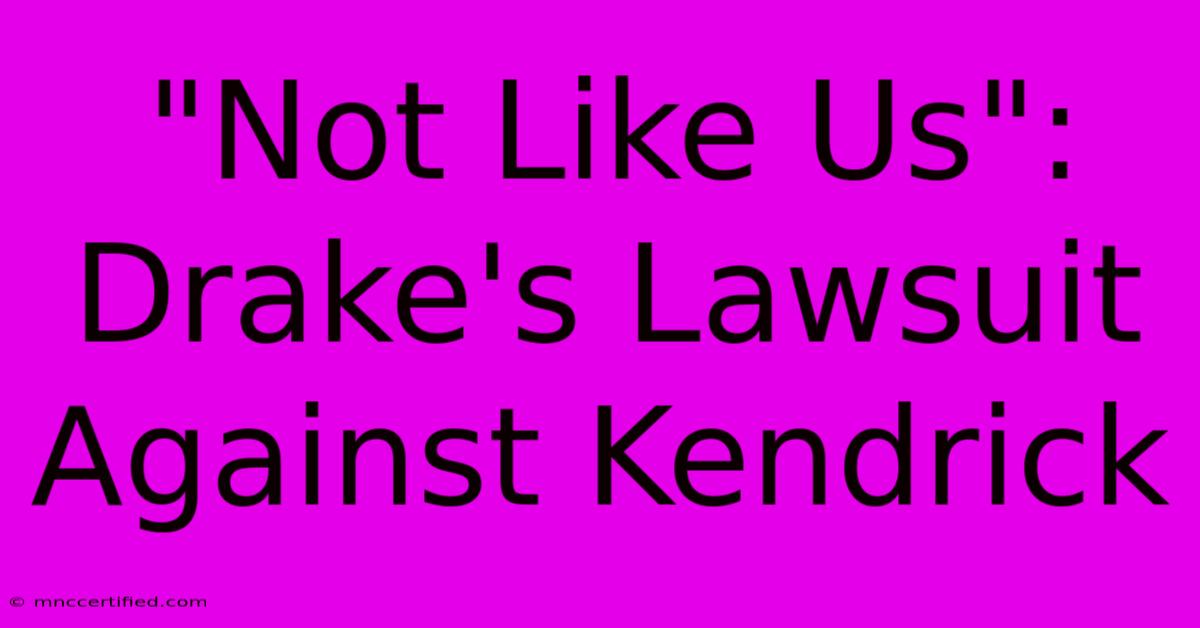"Not Like Us": Drake's Lawsuit Against Kendrick

Table of Contents
"Not Like Us": Drake's Lawsuit Against Kendrick: A Deep Dive into the Hip-Hop Beef
The world of hip-hop is often characterized by fierce rivalries and intense competition. While many battles are waged through lyrical diss tracks, some escalate into legal disputes. One such case that captivated the attention of music fans and legal professionals alike involved Drake and Kendrick Lamar, specifically surrounding the alleged unauthorized use of Drake's music in a Kendrick Lamar-affiliated project. While no official lawsuit with Drake directly named as the plaintiff against Kendrick Lamar exists in public records, this article explores the rumors, speculation, and underlying tensions that fueled this perceived conflict and the legal precedents that could be applied in a similar hypothetical situation.
The Speculation and the "Not Like Us" Claim
Rumors of a potential Drake lawsuit against Kendrick Lamar, or an entity closely associated with him, frequently circulate online. The most prominent focus centers around the alleged unauthorized sampling or use of Drake's music within a project. While the specifics vary across different online discussions, the core issue remains the same: alleged copyright infringement. The phrase "Not Like Us" often surfaces in these conversations, possibly referring to a specific song or lyric that may have been improperly used. This supposed infringement forms the basis of the hypothetical legal battle.
Understanding Copyright Law in Music
Before delving deeper into the supposed Drake-Kendrick conflict, it's crucial to understand the basics of copyright law concerning music. Copyright protects original musical works, including lyrics, melodies, and arrangements. Using copyrighted material without permission from the copyright holder constitutes infringement, potentially leading to legal action. This includes sampling, even if only a small portion of the original work is used. The threshold for infringement is determined on a case-by-case basis, considering factors like the length of the sampled material and its significance to the original work.
Hypothetical Legal Scenarios and Precedents
Let's assume, for the sake of analysis, that Drake did have grounds to pursue legal action against Kendrick Lamar or a closely affiliated party. Several potential scenarios could play out:
- Direct Sampling: If a significant portion of Drake’s music was directly sampled without permission in a Kendrick Lamar-related project, Drake would have a strong claim for copyright infringement. Past cases have set precedents for substantial damages in such scenarios.
- Derivative Work: Even if not a direct sample, if a Kendrick Lamar project incorporates elements significantly derived from Drake's music – melody, rhythm, or lyrical structure – it could still be considered infringement. Proving this derivation might require expert musical analysis.
- Unofficial Remixes: Unofficial remixes using Drake's music without his authorization are a clear violation of copyright. Distribution of such remixes, particularly on commercial platforms, would warrant legal action.
Defenses Against Copyright Infringement
On the other hand, a defense against copyright infringement might involve arguments of:
- Fair Use: This legal doctrine allows limited use of copyrighted material for purposes such as criticism, commentary, news reporting, teaching, scholarship, or research. Establishing fair use requires demonstrating that the use is transformative and doesn't significantly harm the market for the original work. This defense is unlikely to hold in cases involving commercial exploitation.
- Implied License: This is a rare defense, requiring evidence of an implied agreement allowing the use of copyrighted material. In the context of a high-profile musician like Drake, such an argument would be very difficult to prove.
The Importance of Proper Clearance
This hypothetical situation highlights the crucial importance of obtaining proper clearances before using any copyrighted material in a musical work. Failing to do so can lead to costly legal battles, reputational damage, and the potential removal of the infringing material from distribution. Professional music producers and artists always prioritize securing the necessary licenses to avoid such issues.
Conclusion: Rumor, Reality, and the Power of Legal Protection
While a direct lawsuit between Drake and Kendrick Lamar hasn't materialized in public records, the online discussions surrounding the possibility underscore the complexities and potential consequences of copyright infringement in the music industry. This article explored the hypothetical legal implications of such a dispute and stressed the importance of understanding copyright law and adhering to its principles. The power of legal protection in safeguarding creative works remains paramount for all artists, regardless of their fame or status. Remember that even speculative scenarios can offer valuable lessons in navigating the legal landscape of the creative arts.

Thank you for visiting our website wich cover about "Not Like Us": Drake's Lawsuit Against Kendrick. We hope the information provided has been useful to you. Feel free to contact us if you have any questions or need further assistance. See you next time and dont miss to bookmark.
Featured Posts
-
154 M Missing Macys Employee Theft
Nov 26, 2024
-
Future Of Menendez Brothers Appeal
Nov 26, 2024
-
Insurance Broker Business Cards
Nov 26, 2024
-
Huskies Lose To Memphis In Maui
Nov 26, 2024
-
Lake City Investment Lewisville
Nov 26, 2024